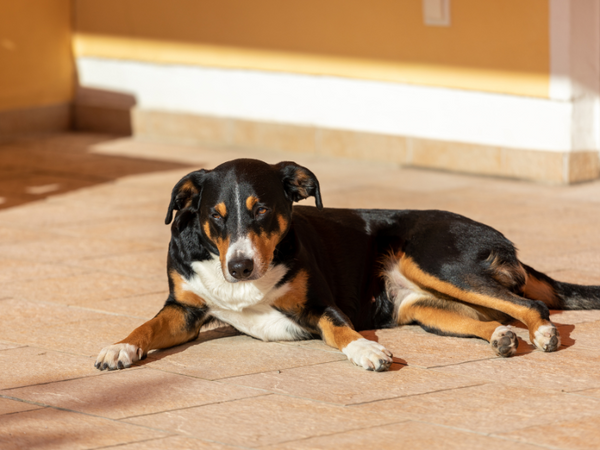No Products in the Cart
Dog Hock Joints - Everything You Need to Know About

As a pet parent, you might want to understand the anatomy and function of your dog's joints, including the hock joint. The hock joint, or "tarsus" in veterinary anatomy, is located on the hind legs of a dog, and is similar to the human ankle joint. In this article, we'll cover everything you need to know about dog hock joints, including common injuries and how to treat them.
What is the hock of a dog?
The hock joint is a complex joint made up of several bones, including the tibia, fibula, and talus. It's responsible for providing stability and support to the hind legs, as well as allowing for movement and flexibility. The joint is held together by a network of ligaments and tendons, which help to maintain its integrity.

© Orthodog
Fun fact: Dogs aren't the only animals with hock joints - horses and cows also have them!
What are the main dog hock injuries?
There are several injuries that can affect a dog's hock joint, including sprains, strains, and fractures. These injuries can be caused by trauma, overuse, or age-related degeneration. Some breeds may be more susceptible to certain types of hock injuries, such as Greyhounds and Whippets, who are prone to Achilles tendon injuries.
-
Hock dislocation: A hock dislocation can occur when a dog sustains a tear in their ligaments or fractures bones in their ankle as a result of being hit by a car or being stepped on.
-
Sprained hock: Tear of the ligaments than can cause limping or lameness. It is similar to a twisted ankle for humans. Running at full speed and getting a paw stuck in a hole can lead to it.
-
Canine Osteochondritis Dissecans (OCD): A developmental condition caused by abnormal cartilage development or damage, OCD can lead to a piece of cartilage or bone becoming separated from the cartilage surface. Although commonly seen in young, large breed dogs, OCD can affect the elbow, knee, or hock, as well as the shoulder.
-
Osteoarthritis of the hock joint: The most frequently encountered type of canine arthritis in the hock joint is osteoarthritis. This degenerative joint disease results from the erosion of protective cartilage and the subsequent rubbing together of bones. Older dogs are particularly susceptible to this condition.
Check our article about osteoarthritis.

How do I know my dog has hock damage?
If your dog has sustained a hock injury, they may exhibit a variety of symptoms, including limping, swelling, and pain that can be manifested by licking. You may also notice a decrease in their mobility or reluctance to bear weight on the affected leg.
If you have a doubt, the best thing to do is to call your veterinarian.
Fun fact: If you're having trouble telling the hock joint apart from other parts of your dog's leg, try looking for the "hock wrinkle" - that's the fold of skin behind the joint that forms when your dog bends their leg.
How do you treat a hock injury?
Treatment for a hock injury will depend on the severity of the injury and the underlying cause. In some cases, rest and supportive care may be all that's needed to allow the joint to heal on its own. However, more severe injuries, such as fractures or ligament tears, may require surgery to repair the damage.
Remember to always consult with your veterinarian if you suspect your dog may have sustained a hock injury.
In addition to veterinary care, there are several things you can do to help your dog recover from a hock injury. These may include modifying their exercise routine, providing supportive care such as orthopedic bedding, hock holder, and supplementing their diet with proven joint-supporting nutrients.
Our Jope Hip and Joint supplement is formulated with UC-II, a proven ingredient that has been shown to effectively alleviate pain and inflammation in dogs suffering from arthritis. In fact, studies have demonstrated that UC-II is even more effective than traditional joint-supporting supplements such as chondroitin and glucosamine.


Dog hock joints are an important part of your dog's anatomy and play a crucial role in their mobility and quality of life. By understanding the common injuries that can affect the hock joint, as well as how to recognize and treat them, you can help your furry friend stay healthy and happy for years to come.
FAQ
What does hock lameness look like?
Hock lameness in dogs often appears as limping, stiffness, or an abnormal gait in the hind legs. You may notice your dog favoring one leg, hesitating to jump, or walking with the hock joint lower to the ground. Swelling, pain when touched, or difficulty bearing weight are also common signs that the hock joint may be injured.
What causes dog hock injuries?
Dog hock injuries can be caused by sudden trauma, overexertion, or chronic joint stress. Common causes include jumping from heights, twisting during play, or slipping on slick surfaces. Certain breeds are more prone to hock issues due to their anatomy or activity level. Obesity and poor muscle support can also increase the risk of injury.
What are the early signs of a dog's hock injury?
Early signs of a hock injury include limping, stiffness after rest, or a visible swelling near the lower part of the hind leg. Your dog might lick the area more than usual or be reluctant to climb stairs or go for walks. Catching these signs early and resting the joint can help prevent more serious damage.


Author: Dr. Jeremy
Doctor of Veterinary Medicine (DVM), MS














Leave a comment